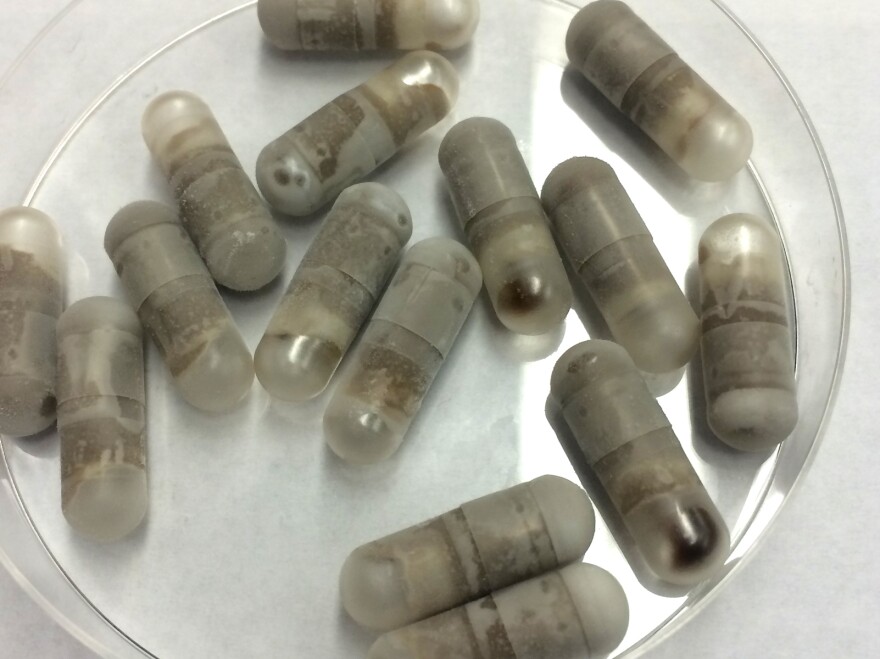"We've reported on this program before about fecal transplants. They’ve been shown to be an effective but complicated way to treat a stubborn infection known as C.diff, which affects many hospital patients with severe and sometimes fatal diarrhea. A recent paper published in both the New England Journal of Medicine and the Journal of the American Medical Association reports encouraging results from a small study that offers the same benefit but in a pill. Dr. David Crabb joins me in the studio to explain how this would work."
Lewis: ... And that topic is stool taken in pill form and some people are now calling them poop pills. To explain how these pills came to exist, first we need to backtrack and talk about C. Diff. Why have these bacterial infections gotten so much attention in recent years?
Dr. Crabb: It’s a bad problem of several decades duration, and it includes, if you will, sort of an evolution of the bacterium to more virulent forms, that you can acquire in the community without quiet the past expectation was. The past expectation was that it happened to people who took antibiotics, and now some people get it who just haven't had it. They get exposed to the spores of this bacterium. Spores are like seeds that are very resistant to cleaning or bleach or sunlight or disinfectants or so on. In fact, the alcohol disinfectants that we use for our hands aren’t strong enough to kill the spores. So, they are removed better by soap and water. So, it’s a tough bacterium, we have more people on antibiotics; they concentrate in our large intensive units, for instance. It's a constant matter of detecting it, isolating people and maintaining this sort of hand and personal contact that you need to stop spreading it from person to person.
Lewis: How did this all start?
Dr: Crabb: There was, years and years ago, simply something called antibiotic associated diarrhea. We simply knew that if you gave people antibiotics some of them would got diarrhea. Often, it would stop when they stopped taking it. And that's still the case. I’m trying to think, probably early in the 80s, people detected this particular organism. It's called Clostridium. It's in the same group of bacteria that causes some really bad things, like...and tetanus. They live in the GI tract. They are called anaerobes. They don't like to grow when there's air around them. And they make these spores that I told you about. So, people discovered that this organism was present. And that there was something that they made that killed cells, like in your intestine and stimulated the cells to secrete liquid and sodium and electrolytes. Finally, it all got figured out exactly what the bacteria was, what the toxins are. We have tests that can very rapidly determine if it's present or not. We know more than ever... But it's still a pretty bad almost-epidemic of diarrhea causing illnesses. The problem addressed in this study is what happens if you get the organism and you take antibiotics which kill it, but it keeps relapsing. That's a much more common problem than the very serious "kill you in the intensive care unit" problem.
Lewis: Is that when the fecal transplants came in to help these people?
Dr. Crabb: Yes.
Lewis: Last year a study in the New England Journal of Medicine found that 1-2 fecal transplants were significantly more effective against C. Diff than an antibiotic? What was the standard of care then before fecal transplants?
Dr. Crabb: It's changed a little bit. It was, ten years ago, to take a reasonably cheap commonly used medicine called Metronidazole. It's called flagyl. It's easy to take, doesn't cause much in the way of side effects and it would kill it off. The hope was always, or at least the presumption was, you killed it off so that the normal bacteria could go back and take it's place. And then, the more severe the disease, and the more often it reoccurred, we used a drug called Vancomycin. Vancomycin is famous now because we use it for MRSA. A lot of Vancomycin is in use. It's a good drug for this because you can't absorb from your intestine, so what you put in your mouth stays in your intestine it reaches a really high concentration. Most people respond to it, but when you stop it, the diarrhea comes back. And they have to go through cycles of retreatment. It's pretty expensive to give orally. and as in the study that we're going to talk about, they chose people who had several relapses. Even if you put them on Vancomycin, and didn't just stop it all of sudden, but went done a little at a time. And that idea is keep the C. Diff. controlled and let your normal bacteria take their place.
Lewis: The poop pills. It sounds pretty disgusting to have to swallow some donor feces in a pill form, but the medical treatment before that wasn't too terrific either. If you were in a medical setting and you were getting the fecal transplant, somehow now the pill is sounding pretty good.
Dr. Crabb: Right. What that was was a feces donor who had been screened as being healthy and didn't carry infectious diseases would provide a sample and that would be mixed up and made into a liquid form and put down a stomach tube, the kind of tube people have after operations, or introduced by way of a calonoscope and sort of sprayed or squirted into the colon.
Dr. David Crabb is a professor of gastroenterology at the Indiana University School of Medicine. You can follow the IU School of Medicine on Twitter at @IUMedSchool.


